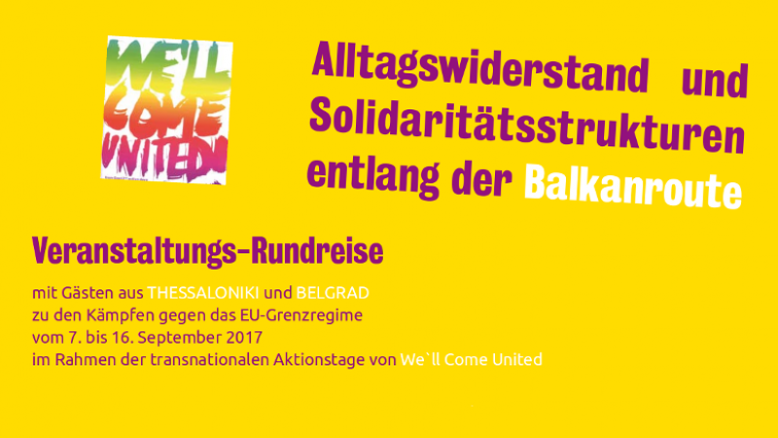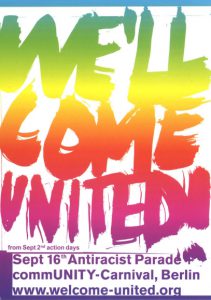Download Flyer [Dt] | Flyer [En] | Poster
Alltagswiderstand und Solidaritätsstrukturen entlang der Balkanroute
Veranstaltungs-Rundreise mit Gästen aus Thessaloniki und Belgrad zu den Kämpfen gegen das EU-Grenzregime vom 7. bis 16. September 2017 (im Rahmen der transnationalen Aktionstage von We`ll Come United)
- Donnerstag, 7. September
MÜNCHEN, 20 Uhr im Bellevue di Monaco, Müllerstraße 2 - Freitag, 8. September
NÜRNBERG, 19.30 Uhr im P 31, An den Rampen 31 - Samstag, 9. September
HANAU, Metzgerstrasse 8 um 17 Uhr im Rahmen eines lokalen Refugee Festivals für We`ll Come United - Sonntag, 10. September
FRANKFURT, 19 Uhr im Cafe Exzess, Leipziger Strasse 91 - Montag, 11. September
OSNABRÜCK, 19 Uhr im Substanz, Frankenstr. 25a - Dienstag, 12. September
GÖTTINGEN, 19.30 in der OM10, Obere Masch-Str 10 - Mittwoch, 13. September
HANNOVER, 20 Uhr im UJZ Korn, Kornstr 28-30 - Donnerstag, 14. September
BERLIN, 19 Uhr im Friedrichshain-Kreuzberg Museum, Adalbertstraße 95a - Samstag, 16. September
Beteiligung/Redebeiträge auf der We`ll Come United Parade ab 11 Uhr vor dem Bundesinnenministerium in Berlin
Die Veranstaltungsreihe wird organisiert von
- Stop Deportation Berlin
- Netzwerk Moving Europe
- mit Unterstützung der Rosa-Luxemburg-Stiftung.
Zum zweiten Mal jährt sich im September der March of Hope vom Budapester Bahnhof Keleti. Tausende Menschen brachen gemeinsam Richtung Österreich und Deutschland auf und machten so ihr Recht auf Migration und Flucht gegen das EU-Grenzregime geltend.
Zwischen November 2015 und März 2016 wurde die erkämpfte offene Route nach und nach wieder geschlossen, und mit dem EU-Türkei-Deal sowie mit der Räumung des Flüchtlingscamps in Idomeni im Mai 2016 ist es um die Balkanroute in Politik und Medien zunehmend stiller geworden.
Doch noch immer sind Menschen in Bewegung und überqueren Grenzen, noch immer gibt es Widerstand gegen die EU-Migrationspolitik und deren Auswirkungen auf den gesamten Balkan.
Wie werden die damaligen Ereignisse bewertet und was hat sich seitdem getan? Aktivist_innen aus Belgrad (der früheren Noborder Serbia Gruppe) und aus Thessaloniki (der Gruppe Clandestina) berichten auf der Rundreise über die aktuelle Situation und vermitteln uns ihre Einschätzungen der Entwicklungen der letzten Jahre.
Auf ihrem Weg nach Westeuropa sitzen nach wie vor Tausende unter verheerenden Bedingungen in Transitländern und an den Grenzen fest.
Sie werden in Camps isoliert oder in Gefängnissen interniert. Illegale Rückschiebungen (sog. Push-Backs) über die Grenzen aller Balkanstaaten gehören – als Einschüchterungs- und Abschreckungsstrategie – zur täglichen Praxis sämtlicher Grenzpolizeien.
Gleichzeitig wurden entlang der Route und auch in Belgrad und Thessaloniki solidarische (Selbst-) Versorgungsstrukturen jenseits des staatlichen Migrationsmanagements aufgebaut. So lebten über 1200 Menschen in Baracken nahe dem Bahnhof in Belgrad. Dort gab es autonome Küchenstrukturen, eine Sporthalle, Handyladestationen und provisorische Duschen. Auch wenn die Menschen dort unter völlig unzureichenden hygienischen Bedingungen und von der Gesellschaft ausgegrenzt lebten, boten die Baracken einen Ort der Selbstorganisierung und die Möglichkeit, sich auf den weiteren Weg hin zu besseren Lebensbedingungen vorzubereiten. Regelmäßig werden solche Räume durch Staat und Polizei zerschlagen. So auch die Baracken in Belgrad, die Anfang Mai 2017 geräumt wurden.
In Thessaloniki wurden drei von und mit Geflüchteten besetzte Häuser bereits im Sommer 2016 geräumt, unmittelbar nach dem dortigen Noborder Camp. Doch auch hier ging und geht der Widerstand weiter und haben sich gemeinsame Strukturen mit Refugee-Communities verfestigt.
Während der Rundreise wollen wir mit den Gästen u.a. diskutieren: Was waren und sind politisch wirksame Aktivitäten, um gegen das Unrecht und die tägliche Gewalt an den Grenzen Widerstand zu leisten? Was sind die besonderen Bedingungen im Transit? Wie sieht nachhaltiger Aktivismus im transnationalen Rahmen aus? Und wie in postsozialistischen Gesellschaften? Wie gelingen Verbindungen und gemeinsame Strukturen in und mit den Communities der MigrantInnen und Geflüchteten?
Die Veranstaltung soll einen Raum bieten für Austausch und Diskussion über Erfahrungen und Möglichkeiten eines solidarischen Aktivismus.
he common language at the events will be English. Please find an English version of this text on facebook.
Webseiten
- https://noborderserbia.wordpress.com
- https://clandestinenglish.wordpress.com
- https://moving-eureope.org/
- https://www.facebook.com/stopdeportationgroup
Die Vortragstour findet im Rahmen der antirassistischen Veranstaltungen und Aktionstage von We‘ll come united statt und geht einher mit dem Aufruf zu transnationalen Aktionstagen ab dem 2. September sowie der Einladung, am 16. September zu einer zentralen Demonstration nach Berlin zu kommen. Eine große antirassistische Parade soll dort u.a. mittels Motivwägen den täglichen Kämpfen der Geflüchteten- und Antirassismus-Bewegung eine öffentliche Plattform geben. Eine Woche vor der Bundestagswahl soll zum Ausdruck gebracht werden, dass es ein breites Bündnis gibt, das sich gegen die restriktive Asyl- und Migrationspolitik entschieden zur Wehr setzt und für eine Gesellschaft ohne Grenzen und mit gleichen Rechten für Alle kämpft. Die transnationale Vernetzung von Aktivist_innen und Kämpfen begreifen wir als ein notwendiges Element dieses Protests.
:::::
[En]
Daily Resistance and Solidarity Structures along the Balkanroute
Info-tour with guests from Thessaloniki and Belgrade regarding the struggles against the EU border regime from 7th to 16th September 2017 within the transnational action days of We`ll Come United
Thursday, September 7th
MÜNCHEN, 20 Uhr at Bellevue di Monaco, Müllerstr. 2
Friday, September 8th
NÜRNBERG, 19.30 Uhr at P 31, An den Rampen 31
Saturday, September 9th
Hanau, Metzgerstrasse 8 at 5pm as part of a local Refugee Festival for We`ll Come United
Sunday, September 10th
Frankfurt, 7pm at Cafe Exzess, Leipziger Strasse 91 (room requested)
Monday, September 11th
Osnabrück, 7pm in Substanz, Frankenstr. 25a
Tuesday, September 12th:
GÖTTINGEN, 19.30 Uhr at OM10, Obere Masch-Str. 10
Wednesday, September 13th: Hannover
HANNOVER, 20 Uhr at UJZ Korn, Kornstr. 28-30
Thursday, September 14th:
BERLIN at 7 pm at Friedrichshain-Kreuzberg Museum, Adalbertstr. 95a
Saturday, September 16th: Participation/ contribution at the We`ll Come United Parade from 11am in front of the Interior Ministry in Berlin
The info-tour is organized by
- Stop Deportation Berlin
- the Moving Europe network.
- It is supported by the Rosa Luxemburg Foundation.
We´ll come united – Let´s talk about Thessaloniki, Belgrade and Berlin
Resistance along the Balkanroute – voices from Thessaloniki and Belgrade
In September the second anniversary of the March of Hope from Budapest’s Keleti Railway Station will take place. Thousands of people started to move collectively towards Austria an Germany and with that claimed their right on flight and migration against the EU border regime.
However, from November 2015 to March 2016, the open route was systematically closed again, and with the following EU-Turkey deal and the eviction of the refugee camp in Idomeni in May 2016, the Balkan route in politics and then media became increasingly quiet.
However, there is still a lot to report, people are still on the move and cross borders, there is still resistance to EU migration policy and its impact in the Balkans as a whole.
How to evaluate this history and what happended afterwards?
Activists from Belgrade (from the former Noborder Serbia group) and from Thessaloniki (from the group Clandesitini) will report within the framework of the info tour on the current situation and share their assessments as well as perspectives on the developments of recent years.
On their way to Western Europe still thousands of people are stucked in transit and border areas in devastating conditions. They are isolated in camps or are put into prisons. Illegal pushbacks at the borders of all Balkan states are part of the daily practice of the border police, to deter and to intimidate people.
WEBSITES
- https://noborderserbia.wordpress.com/
- https://clandestinenglish.wordpress.com/
- https://moving-europe.org/
- https://www.facebook.com/stopdeportationgroup
- https://www.facebook.com/events/106917169991553
At the same time, in cities such as Belgrade and Thessaloniki, solidary- structures were built in opposition to the states migration management. Thus over 1200 people lived in barracks near the railway station in Belgrade. There were autonomous kitchen structures, a sports hall, a charging point for mobiles and provisional showers. Even if the people there lived in completely inadequate hygienic conditions and excluded from society, it was a possibility to prepare for the further way to better living conditions.
The barracks in Belgrade were also a place for self organization. Such spaces are regularly attacked by the state and the police. So also the barracks in Belgrade, which were evicted in early May 2017.
In Thessaloniki, three houses squatted by and with refugees were evicted already in the summer of 2016, immediately after the Noborder Camp took place there. But also here the resistance went on and common structures with Refugee communities were strenghtened.
During the event tour, we want to discuss with the guests: What have been and still are politically effective activities to resist the injustice and daily violence at the borders?
What are the special conditions in transit?
How does sustainable activism look like in a transnational framework? How in postsocialist societies?
How do connections and common structures in and with the communities of migrants and refugees work?
The event is intended to provide a space for exchange and discussion on the experiences and possibilities of a solidarity-activism.
The common language at the events will be English.
The info tour will take place during the antiracist events and action days of „We’ll Come United“ and will be accompanied by a call for transnational events from September 2nd as well as for a central demonstration in Berlin on September 16th.
A big antiracist parade is under preparation in order to create a public platform to the daily struggles of the Refugee and Antiracist movement.
One week before the federal elections in Germany, it is to be said that there is a broad alliance which resolutely opposes the restrictive asylum and migration policy and fights for a society without borders and for equal rights for all. We see the transnational networking of activists and struggles as a necessary element of this protest.


